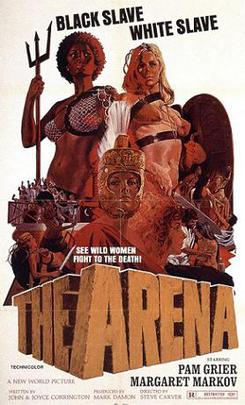Production
The movie was one of a series of women in prison films that Roger Corman co-financed following the success of The Big Doll House , including The Big Bird Cage , The Hot Box and Black Mama, White Mama . Most of those films had been shot in the Philippines but The Arena would be a European co production. Corman recalls, "It was the story of women and gladiators, based loosely on the Spartacus story. Again it was an attempt to make an R-rated film with some sex, some violence, some humor, and a political theme. The theme here was simply freedom with a women’s-lib viewpoint." [3]
Martin Scorsese said that Roger Corman offered him the film to direct following Boxcar Bertha . However he elected to make Mean Streets instead. [4]
Pam Grier was excited to make the film as it involved a trip to Italy and she had enjoyed working with Markov. [5]
The movie was the first feature directed by Steve Carver, who worked in post production at New World. Carver recalled " The script had several scenes in which the girls were undressed—one of Roger’s prerequisites. A clause in Pam and Maggie’s contracts included full frontal nudity and precluded any discussions whatsoever." He said Fredrico Fellino was shooting Amacord at the same studios and came to visit the production. [6]
Whereas Steve Carver is credited as the director in the American version of the film, the Italian version omits Carver and names "Michael Wotruba" as director instead. [2] Michael Wotruba was a pseudonym then used by Joe D'Amato. [2] D'Amato is credited in both versions as cinematographer under his birth name Aristide Massaccesi. [2]
In an interview, D'Amato said the Italian producer Franco Gaudenzi did not trust Carver, who was sent by Roger Corman, and sent D'Amato to take care of the cinematography and help Carver if needed. [2] According to D'Amato, Carver ended up directing the scenes with dialogues whereas he himself took care of the fight sequences in the arena. [2]
D'Amato called the movie "a fascinating experience. I was just the director for hire on that... and I knew going in I wouldn't receive the proper credit. I was only listed as the director of photography on the titles. I saw it again recently on American TV. It was far better than my original version released in Italy because [Joe] Dante cut it faster." [7]
Joe Dante was credited as editor for the US release of the film, but he did not work on the movie. Dante says “Jon Davison was told to dream up a bunch of phoney Anglo names to replace the original Italian credits, and he thought it would be funny to put my name in there. The real editor's name was Giuseppe something-or-other, and that gave him the idea." [8]
Margaret Markov and producer Mark Damon met on the film and later married.
Reception
Kevin Thomas of The Los Angeles Times called it "one of the more perverse side effects of women's lib... Miss Grier is spirited and game, as usual. Miss Markov is as beautiful as she is untalented. Gratefully, there's much risible dubbed dialogue." [9]
Roger Corman recalled, " The film was quite successful, particularly because by this time two of the girls we had been working with, who were really very beautiful—a white girl, Margaret Markoff, and a black girl, Pam Grier—were beginning to be well known and were emerging somewhat as stars of this kind of film." [3]
This page is based on this
Wikipedia article Text is available under the
CC BY-SA 4.0 license; additional terms may apply.
Images, videos and audio are available under their respective licenses.
